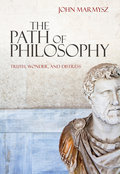
The Path of Philosophy introduces college students to the study of philosophythrough a compelling narrative in which the world's most important philosophers appear as characters. Framed by the concept of Wondrous Distress, the text traces the history of western philosophy from its beginnings in ancient Greeceto contemporary developments in the modern world. Threads running through thetext demonstrate how philosophy is unique and distinct from religion and science, while at the same time showing how all three disciplines are interrelated. Exceptionally well written, and unusual in its cohesiveness, the text leavesreaders with a vivid picture of philosophy as a unique and important field ofstudy. INDICE: Acknowledgments. Preface. INTRODUCTION. Analytic and Continental Styles of Philosophizing. The Love of Wisdom. Religion, Science and Philosophy.What is Philosophy? Philosophy as Wondrous Distress. 1. MYTH, SCIENCE AND PRESOCRATICS. Mythic Thinking. Presocratic Thinking. The Milesian School: Thales and Anaximander Heraclitus. Parmenides and the Eleatic School. The Atomist School: Democritus and Leucippus. From Mere Wonder to Wondrous Distress. 2. SOCRATES. The Difficulty of Perspective. Plato's Socrates. The Influence of Anaxagoras. The Socratic Method. The Trial of Socrates. Xenophon's Socrates. Aristophanes' Socrates. The Wondrous. Distress of Socrates. 3. PLATO. Plato's Divergence from Socrates. The Divided Line. The Myth of the Cave. Plato's Perfect Republic. Plato and Art. Wonder and Distress in Platonic Thinking. 4. ARISTOTLE. Aristotle's Break with Plato. Aristotle and the Nature of Change. The Four Causes Aristotle's Logic. The First Mover. Rationality, Emotion and the Golden Mean. Aristotle's Philosophy of Art. Aristotle and Wondrous Distress. 5. THE HELLENISTIC PHILOSPHERS. The Decline of Greek Power and Hellenistic Negativity. Cynicism. Stoicism. Epicureanism. Skepticism. Suicide and Hellenistic Philosophy. Wonder and Distress in Hellenistic Philosophy. 6. MEDIEVAL PHILOSOPHY. The Patriarch Abraham and the Covenant with God. Jesus. Muhammad. St. Augustine. The Question of Evil. Islamic Contributions to Early Medieval Thought. Al-Kindi and. NeoPlatonism. Al-Farabi. Avicenna. Averroes. Christian A Priori and A Posteriori Arguments for God's Existence. St. Anselm. The Ontological Argument. Criticisms of the Ontological Argument. St. Thomas Aquinas. The Five Arguments for God's Existence. Criticisms of Aquinas' Five Arguments. Wondrous Distress in Medieval Thought. 7. RENE DESCARTES AND THE TRANSITION FROM MEDIVAL TO MODERN THINKING. The Conflict Between Science and Religion in the Early Modern Period. Modern Developments in Astronomy. The Geocentric Model of the Universe. The Heliocentric Model. René Descartes. Meditations on First Philosophy. Meditation I. Meditation II. Meditation III. Meditation IV. Meditation V. MeditationVI. Descartes and Wondrous Distress. 8. HUME. The Mind/Body Problem. "Solutions" to the Mind/Body Problem. Thomas Hobbes and Materialism. George Berkeley and Idealism. Arnold Geulincx, Nicholas Malebranche and Occasionalism. Gottfried Leibniz, Baruch Spinoza and Monism. David Hume and the Rejection of Cartesian Metaphysics. John Locke. The Good Natured Hume. The Inquiry Concerning HumanUnderstanding. Impressions, Simple Ideas and Complex Ideas. Relations of Ideas and Matters of Fact. Cause and Effect. The Ideas of God and the Self. An Inquiry Concerning the Principles of Morals. Utility. Hume and Wondrous Distress.9. KANT'S TRANSCENDENTAL IDEALISM. Totalizers vs. Critics. The Awakening of Kant. The Critique of Pure Reason. The Phenomenal and Noumenal Worlds. The A Priori Intuitions of Time and Space. The Categories of the Understanding. Transcendental Idealism and the Impossibility of Metaphysics. The Regulative Function of Transcendental Ideas. The Critique of Practical Reason. The Good Will. Hypothetical vs. Categorical Imperatives. The Critique of Judgment. Beauty. Sublimity. Kant's Wondrous Distress. 10.HEGEL AND THE MANIFESTATIONS OF GEIST. TheDifficulty of Hegel's Philosophy. Hegel's Vision of Unity. The Phenomenology of Spirit Lordship and Bondage. Stoicism, Skepticism and the Unhappy Consciousness. Dialectical Logic. The Abstract Side. The Dialectical Side. The Speculative Side. Absolute Knowing The Doctrine of Being. God. Hegel's Influence. Right, Center and Left Hegelianism. Ludwig Feuerbach. Max Stirner. Karl Marx. Wondrous Distress in Hegelian Philosophy. 11. HAPPINESS, SUFFERING AND PESSIMISM IN KIEREGAARD. Schopenhauer, Nietzsche and Mill. Sören Kierkegaard: The Knight of Faith. The Sickness Unto Death. Fear and Trembling. Schopenhauer's Synthesis of Plato, Kant and Hinduism. Piercing the Veil of the Thing-In-Itself. The Will. Anxiety, Suffering and Distress. Friedrich Nietzsche and Positive Nihilism. Will-To-Power. The Superman and the Death of God. Beyond Good and Evil: Nietzsche Contra Utilitarianism. The Greatest Happiness Principle Wonder andDistress in Schopenhauer, Nietzsche and Mill. 12. COMMON SENSE AND ANGLO-AMERICAN PHILOSOPHY. The Reaction Against Hegel. William James. Pragmatism. The Tender and the Tough Minded. The Pragmatic Method. The Pragmatic Theory of Truth. Religion. Bertrand Russell Russell's Rejection of Hegel. Logical Atomism. Epistemology. Knowledge by Acquaintance and Knowledge by Description. The Role of Philosophy. Ludwig Wittgenstein. Tractatus Logico-Philosophicus. Philosophical Investigations. Wondrous Distress in Anglo-American Philosophy. 13. EXISTENTIALISM AND THE RETURN TO BEING. Nationalism, Imperialism, Technology and War.Nihilism and the Decline of Civilization. Friedrich Nietzsche. Oswald Spengler. Totalitarianism. The Muselmann. Martin Heidegger The Question of Being. Dasein. Being-Toward-Death. Inauthenticity and Technological Thinking. Authenticity. Heidegger and Nazism. Jean-Paul Sartre. Being-in-itself and Being-for-itself. Freedom and Bad Faith. Simone DeBeauvoir. The Second Sex. Otherness. Womenand Biology. Wondrous Distress in Existentialism. Conclusion: Philosophy and Wondrous Distress. Bibliography.
- ISBN: 978-0-495-50932-5
- Editorial: Wadsworth
- Encuadernacion: Rústica
- Páginas: 464
- Fecha Publicación: 31/01/2011
- Nº Volúmenes: 1
- Idioma: Inglés
